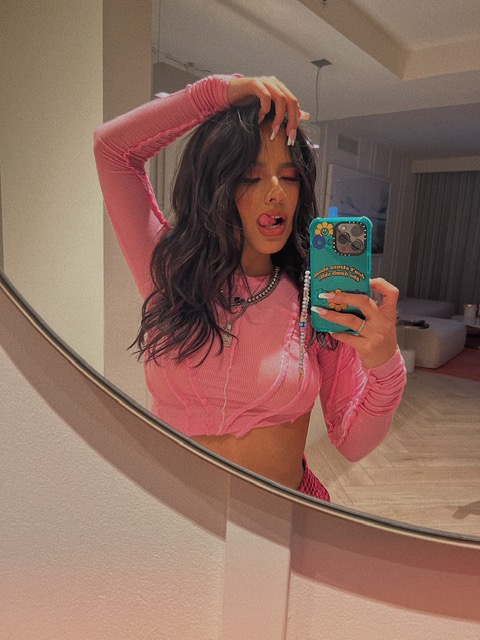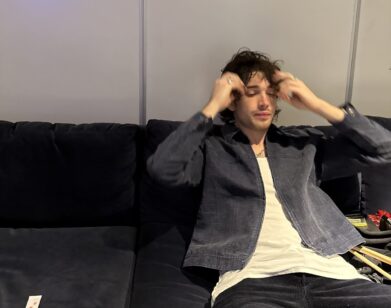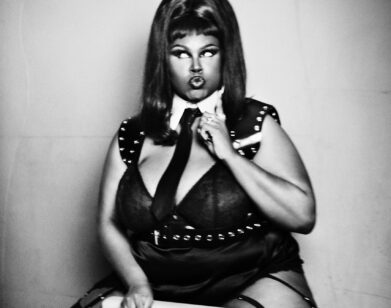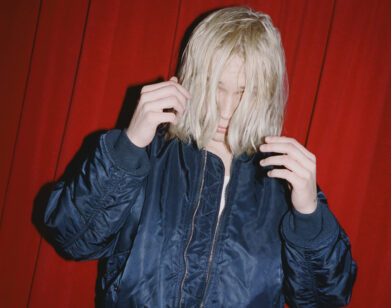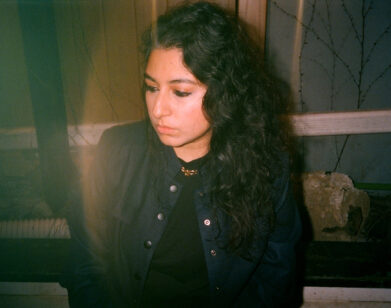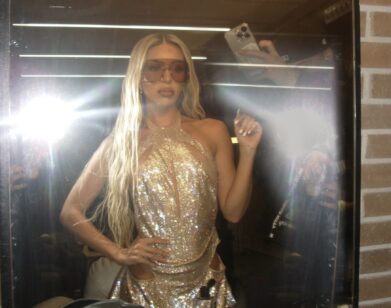music!
For Becky G, Being a Mami Is a Way of Life
As a teenager, Becky G, born Rebbeca Marie Gomez, was told she’d never make it as a musician. But the Inglewood native wasted no time proving her doubters wrong. By the time she was 17, Gomez had collaborated with the likes of Will.i.am, Cody Simpson, and Pitbull, and her 2014 multi-platinum single, “Shower,” rocketed her to the top of the Billboard Hot 100 chart. This week, Gomez—now 25— released her sophomore album, Esquemas, a Spanish-language record that explores the duality of her Mexican-American heritage and her South Central L.A. roots. Esquemas features the single “Mamiii,” released in collaboration with reggaeton superstar Karol G, which is currently at #2 on the Hot Latin charts. Before Gomez took the stage at the Billboard Awards last weekend, she called Interview for a chat about uphill battles that have defined her career, the leap from Inglewood to Hollywood, and the family support that makes it all worthwhile.
———
ERNESTO MACIAS: Where in the world are you?
BECKY G: Miami! We’re doing the launch party here.
MACIAS: What did you have for breakfast today?
BECKY G: Coffee and cardio. Because I am trying to get it tight, get it right for the Billboard Awards.
MACIAS: When you were a kid, what did you want to be when you grew up?
BECKY G: I knew from the beginning that I wanted to be a pop star like Selena, Christina Aguilera, and J.Lo.
MACIAS: You’ve tried almost everything at this point—singing, acting, you have your own beauty brand. Was it always your plan to go beyond music
BECKY G: These things have been my goals list since I was a little girl. I have pictures of me in full glam at like six years old. As I’ve gotten older, my approach has definitely has evolved, but the desire to accomplish them has always been there.
MACIAS: Your new album Esquemas is coming out tonight at midnight. Describe the album in three words.
BECKY G: I love that you said three. I would say it’s genreless—it doesn’t have a singular sound, which I love. I grew up in Inglewood, Chicana, Mexican-American, representing two flags. I grew up listening to all kinds of music in English and Spanish, and I’ve woven the two together. There’s Anglo-style production with Spanish melodies and lyrics, and vice versa. I wanted to bring traditional Mexican influences to pop music. It’s also adventurous—it takes you on a trip, and one song bleeds into the next. And last, it feels very authentic. I’ve always strived to be as true as possible. Sometimes we adapt or shapeshift to be more successful in this industry. I started when I was so young, and I didn’t realize how impressionable I was. I’m really coming into my own now, and you can hear that in this album.
MACIAS: You collaborated with Karol G on this album. What’s your favorite aspect of collaboration?
BECKY G: That you’re not in it alone. This industry can be very lonely, and sometimes I really crave a connection with people who really understand what it is to be in my shoes. For so long, I was the youngest person, or the only woman, or the only brown girl in the room. I felt isolating. So finding artists who understand the hard work and sacrifice that comes with success makes all of it feel more meaningful. It’s easy to make a hit song, but it’s hard to create a moment in history— or in your life—that can never be repeated. My song “Sin Pijama” with Natti Natasha, “Mayores” with Bad Bunny, or “Mamiii” with Karol G, those aren’t just hit songs. Those are pivotal moments in my life.
MACIAS: What does it mean to you to be a “Mami”?
BECKY G: Being a Mami is a way of life. There are a lot of Latin terms that we use to empower one another—Mami and chingona are two that I grew up with. To be a Mami is to accept yourself, you gotta be so confident that you’re not threatened by other women, you celebrate other women.
MACIAS: What was it like to perform at the Oscars? Were you nervous?
BECKY G: I wasn’t. I was really excited, and sometimes ignorance is bliss. I’d never been in that kind of environment before, so I was just excited to be there. Then you’re in the middle of it, and you realize just how nariz arriba (“bougie”) it can be. People were in suits and ball gowns at 7 a.m. for soundcheck, and I’m in my sweats and without makeup blasting music on my portable speaker. For me, it was a huge accomplishment. Technically on a day with no traffic, Inglewood isn’t too far from Hollywood. But figuratively, it always felt like an eternity away. It was weird being so close to home, but being at Hollywood’s biggest night with Hollywood’s biggest stars.
MACIAS: Who were some of your inspirations growing up?
BECKY G: My grandparents played a pivotal role in how I look at life. They came from Jalisco with literally the clothes on their backs and no money to give their kids a brighter future. Seeing their ability to make something out of nothing has always fascinated me. When I find myself in a tough position, I remind myself that if they did it, I can do it. I’m really blessed. Up until recently, I had all four of my grandparents very involved in my life—they’re taught me Spanish, showed me the music they grew up with, and made sure I never forget where we came from. I’m proud that I can create full bodies of work in a second language, and do that for them. It makes it all worth it in the end.
MACIAS: What would you say to 16-year-old Becky?
BECKY G: I would say enjoy the ride. Stop getting ahead of yourself. It’s not gonna be easy, but it’s always gonna be worth it. I’m the oldest of four kids–my parents were high school sweethearts, and they were babies having babies, so we all kind of grew up together. My parents feel more like my brother and sister, and they’re always tried their absolute best, but sometimes I’m like, “Okay, who do I look to? How do I do this?” When I was young, people would be like, “You’re so mature for your age!” I prided myself on that, without realizing that it’s because of this generational trauma that makes young parents not really fully present. So, 16-year-old Becky, “Don’t try to act like you’re 25, because then when you’re 25 you’re gonna feel 40.”
MACIAS: That’s a message that a lot of mixed-heritage kids need to hear. As someone with a similar background, you don’t always understand that legacy. On a lighter note, what’s on your phone’s lock screen?
BECKY G: My phone lock screen is actually a picture of my papi [grandfather], on his ranch with his cows, and he’s smiling. He passed away last year, but he spent most of his working in the States. When I look at that picture, it brings me peace and I’m reminded. He often comes to me in numbers. When it’s 11:11 or 2:22, I’m like, “Hi, grandpa!” I screenshot it and I usually post it online.
MACIAS: Who was your first fashion icon?
BECKY G: My mom—although looking back, she made some questionable fashion choices. My mom in high school was such a mood, and I’ve woven that influence into the album. I’m embracing my natural hair, which looks a lot like her hair as a teenager. I FaceTimed her after my glam team did my look for the album cover shoot, and she said, “You look like me in high school!” Just like I predicted she would. It was so funny.
MACIAS: What is one thing people get wrong about you?
BECKY G: A lot, to be honest. But the thing I struggle with the most is that people think I sing in Spanish because it’s popular now. I started my career singing in English, but that’s my first language, and my parents were born here so they speak English. My brother Alex was diagnosed with autism before he turned two years old, and the doctors thought he’d never be able to speak, walk, or live an independent life. They said his only chance of learning to communicate was if we chose one language to speak at home. My mom chose English. But I’ve always repped my city and my roots, and that makes me really proud. I also pride myself on having really practiced my Spanish. I think that intention actually goes really far with our community. But some people still get it a little twisted.
MACIAS: What do you want your fans to take away from this new album?
BECKY G: I hope it leaves them inspired. I’m turning a new leaf in my life. I feel both more grounded and more uncomfortable than I’ve ever been. I’m asking myself better questions, and understanding why I made the choices I did as an artist that got me to this point. At one point, I was told that I was never going to be allowed to release an album, so releasing my second album is a huge personal success for me. I want this album to tell people that it’s okay to just exist—that is enough.
MACIAS: On that note, what is one thing that you haven’t tried yet?
BECKY G: I want to do a collaborative project with other up-and-coming artists from Mexico. I feel so proud of my roots. A lot of people say, “Why is this Chicana doing reggaeton?” Don’t get confused. I know who I am and where I come from, I just love reggaeton because my mom used to play Daddy Yankee when I was little, and Jenny [Rivera], and all of the greats. I also love mariachi, and I’d love to explore that, too. That’s next.

